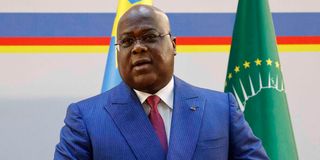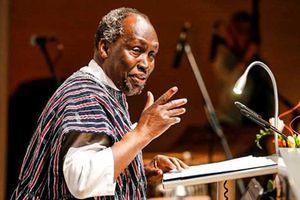Prime
DRC President Félix Tshisekedi aims for second term

Democratic Republic of Congo's President Felix Tshisekedi addresses media during a visit of the French President at the National Biomedical Research Institute (NBRI) in Kinshasa on March 4, 2023.
In the Democratic Republic of Congo, the electoral campaign has not yet begun for the elections scheduled for 20 December, but the political landscape is in turmoil.
President Félix Tshisekedi, a candidate in his own succession, is aiming to stay in office for a second term, his last under the constitution.
His challengers have already begun to mobilise, organising street demonstrations against, among other things, the "high cost of living" in the DRC and the organisation of "proper elections". The atmosphere is that of an electoral campaign ahead of schedule.
The Congolese Head of State has already announced that he will be a candidate in the presidential election. 4 other candidates have already announced their candidacy.
They are the former prime minister of former president Joseph Kabila, Augustin Matata Ponyo; the MP Delly Sessanga; Moïse Katumbi, former governor of Haut-Katanga and above all Martin Fayulu, the losing candidate in the 2018 presidential election to Tshisekedi. In the end, we can expect more than 10 candidates.
Tshisekedi's four challengers are currently taking joint action. They are attacking Félix Tshisekedi's record, which they consider mediocre. In their view, the current President of the DRC "has not succeeded in restoring security to the country and his mismanagement has ended up fuelling a food crisis in the country".
M23 resurgence
Katumbi, Matata, Sessanga and Fayulu point to the persistence of armed groups in the east of the country, and above all the resurgence of the M23, to point the finger at "Félix Tshisekedi's incompetence", arguing that the security policy put in place by President Félix Tshisekedi "has failed", especially as the death toll has risen: "more than 4,000 civilians have been killed since the state of siege was declared.
Armed groups such as the ADF, affiliated with the Islamic State, have extended their area of influence in the face of the Congolese army's offensives. Worse still, the M23 rebellion, which was defeated in 2013, has suddenly woken up in the middle of a state of siege and has taken over many towns in North Kivu".
Those opposed to Félix Tshisekedi point out that since then, more and more people have fled their villages. According to UN figures, more than a million people have taken refuge abroad and nearly 6 million are internally displaced.
To drive the point home, Olivier Kamitatu, the spokesman for Moïse Katumbi, points to figures from a study carried out by the Food and Agriculture Organization of the United Nations and the World Food Programme, according to which "27 million people in the DRC are facing crisis conditions or acute emergency food insecurity, and the situation could worsen in the coming months without increased assistance".
Deteriorating security situation
Government spokesman Patrick Muyaya rejects Olivier Kamitatu's accusations, arguing that the deteriorating security situation in the east of the DRC should not be blamed on Tshisekedi.
"The security situation in the east of our country is a legacy. It has been going on for almost 30 years since the Rwandan genocide, and today we are on a path that will enable us to settle it definitively through the Nairobi and Luanda processes", retorted Muyaya. The two processes cited by the Congolese government spokesman are supposed to bring peace via a dialogue held under the auspices of the leaders of the East Africa and Great Lakes regions.
Muyaya also adds that the DRC has now started to work on rebuilding the army, with a budget of one billion dollars allocated under the military programming law. "We have a defence policy that we haven't had since the 1960s", Patrick Muyaya emphasised.
As for the food crisis, Félix Tshisekedi's supporters reject all the opposition's criticisms, denouncing "purely political posturing". Here again, Muyaya points out that "the DRC has never been so resilient. We have 8.9% growth, the highest in Africa. The DRC has joined the club of the 10 richest countries in terms of GDP", says the Minister of Communication, Patrick Muyaya.
In Kinshasa, the stage is set for a fierce battle ahead of the elections, for which the political class is now certain that the Congolese will go to the polls on 20 December.
The president has already said that the polls will be held on that date. The chairperson of the Electoral Commission, Denis Kadima, has also confirmed that polls in DRC are not going to be postponed.





